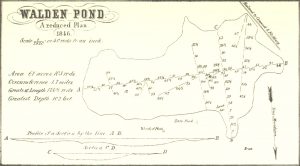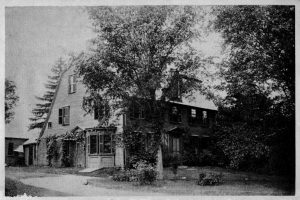Thoreau writes in Walden:

Prudence Ward writes:
Thoreau lectures on “The Writings and Style of Thomas Carlyle” at the Unitarian Church for the Concord Lyceum (Studies in the American Renaissance 1995, 147-148), later published as “Thomas Carlyle and His Works“.
Charles Lane writes to Thoreau:
The books you were so kind as to deposite about two years and a half ago with Messers Wiley and Putnam have all been sold, but as they were left in your name it is needful in strict business that you should send an order to them to pay to me the amount due. I will therefore thank you to enclose me such an order at your earliest convenience in a letter addressed to your admiring friend,
Charles Lane
Post Office New York City
Thoreau writes in his journal:
Thoreau writes in Walden:
Thoreau writes in his journal:
Charles Lane writes to Thoreau in reply to his letter of 26 February:
Dear Friend,—
If the human nature participates of the elemental I am no longer in danger of becoming suburban, or super-urban, that is to say, too urbane. I am now more likely to be converted into a petrifaction, for slabs of rock and foaming waters never so abounded in my neighborhood. A very peter I shall become: on this rock He has built his church. You would find much joy in these eminences and in the views therefrom.
My pen has been necessarily unproductive in the continued motion of the sphere in which I have lately been moved. You, I suppose, have not passed the winter to the world’s unprofit.
You never have seen, as I have, the book with a preface of 450 pages and a text of 60. My letter is like unto it.
I have only to add that your letter of the 26th February did its work, and that I submit to you cordial thanks for the same.
Yours truly,
Chas. Lane.
I hope to hear occasionally of your doings and those of your compeers in your classic ploughings and diggings.
Thoreau expands the first draft of A Week on the Concord and Merrimack Rivers with passages from his journal, lectures, and essays “Sir Walter Raleigh” and “The Service,” and combines two “Thursday” chapters (Revising Mythologies, 254).
Bronson Alcott writes in his journal:
Henry Thorough [sic] thought we asserted this claim for the fair Hebrew in exaggeration; and declared against our estimate with some vehemence. I asserted his claim as a poet—the poet of the moral instinct—yet as the mythological personage now to Christendom, who had no clear perception of his ideas and actions.
Ralph Waldo Emerson pays Thoreau $5 for building a fence on his schoolhouse lot (Ralph Waldo Emerson’s account books. Houghton Library, Harvard University, Cambridge, Mass.).
Bronson Alcott writes in his journal:
Bronson Alcott writes in his journal that he walks to Walden Pond and spends a few moments with Thoreau (Amos Bronson Alcott papers. Houghton Library, Harvard University, Cambridge, Mass.).
Bronson Alcott writes in his journal that he holds an evening conversation about nature at Lucy Jackson Brown’s house with Ralph Waldo Emerson and Thoreau in attendance (Amos Bronson Alcott papers. Houghton Library, Harvard University, Cambridge, Mass.).
Bronson Alcott writes in his journal that Thoreau will survey Hilltop (Amos Bronson Alcott papers. Houghton Library, Harvard University, Cambridge, Mass.).
Nathaniel Hawthorne’s Mosses from an Old Manse is published:

Ralph Waldo Emerson writes in his journal:
Ralph Waldo Emerson pays Thoreau $9.35 for fence work and painting (Ralph Waldo Emerson’s account books. Houghton Library, Harvard University, Cambridge, Mass.).
Ralph Waldo Emerson presses Thoreau to publish A Week on the Concord and Merrimack Rivers; Thoreau prepares further additions to second draft (Revising Mythologies, 254).
Bronson Alcott writes in his journal:
Bronson Alcott writes in his journal that Thoreau has supper with him and talks interestingly (Amos Bronson Alcott papers. Houghton Library, Harvard University, Cambridge, Mass.).
Samuel Staples, the village jailer, jails Thoreau for refusing to pay his poll tax after several warnings. Thoreau will not pay because he feels that the tax supports slavery. Thoreau spends the night in jail although someone, probably his Aunt Maria, paid his taxes.
Thoreau writes in “Resistance to Civil Government:”
Bronson Alcott writes in his journal:
Thoreau spent an hour or two, conversing mostly on his late imprisonment in jail (The Journals of Bronson Alcott, 184).
The annual meeting of the Concord Women’s Anti-Slavery Society is held on the doorstep of Thoreau’s Walden Pond house to commemorate the 2nd anniversary of the freeing of slaves in the West Indies.
Bronson Alcott writes in his journal:
Horace Greeley writes to Thoreau:
Believe me when I say that I mean to do the errand you have asked of me, and that soon. But I am not sanguine of success, and have hardly a hope that it will be immediate if ever. I hardly know a soul that could publish your article all at once, and ‘To be continued’ are words shunned like a pestilence. But I know you have written a good thing about [Thomas] Carlyle—too solidly good, I fear, to be profitable to yourself or attractive to publishers. Didst thou ever, O my friend! ponder on the significance and cogency of the assurance, “Ye cannot serve God and Mammon,” as applicable to Literature—applicable, indeed, to all things whatsoever. God grant us grace to endeavor to serve Him rather than Mammon—that ought to suffice us. In my poor judgment, if any thing is calculated to make a scoundrel of an honest man, writing to sell is that very particular thing.
Yours, heartily,
Horace Greeley.
Remind Ralph Waldo Emerson and wife of my existence and grateful remembrance.
Horace Greeley writes to George Rex Graham:
I send you herewith an account of the Life, Character, Genius and Works of Thomas Carlyle, by one of the only two men in America capable of giving it. The very best man to do this is, of course, Ralph Waldo Emerson, and this is by the second-best, Mr. Emerson’s pupil, friend and daily companion, Henry D. Thoreau, whose essays and translations of some of the grand Greek Tragedies in The Dial made a deserved sensation. Thoreau is a young man, a scholar, poor of course, and sends this to me to get utterance and bread. I know it is unlike the general staple of your Magazine, but I think it will on that account be relished and give a zest to the work. That it is a brilliant as well as vigorous essay, and gives a Daguerreotype of Carlyle and Carlylism which no man living but Emerson could excel, I believe any scholar would say, and I am confident it would attract many new readers to the Magazine. It would make about a sheet or sixteen pages of the Mag. and would probably have to be divided—I hope but once. If you choose to publish it, and pay as much as you pay others for right good prose (where you are not buying a name) I will make it sell a pile of Magazines, anyhow.
I offer it first to you, and ask you to let me have your decision upon it as soon as practicable. Keep the MS. till I send for it, as I may think best to offer it to Godey if you don’t want it.
Yours,
Horace Greeley
Thoreau begins his journey to Maine and writes:
Thoreau writes:
Thoreau writes:
Thoreau writes:
Thoreau writes in The Maine Woods:
Thoreau writes in The Maine Woods:
Thoreau writes in The Maine Woods:
Thoreau writes:
Thoreau writes:
Thoreau writes:
Ralph Waldo Emerson writes to his wife, Lidian Emerson:
Bronson Alcott writes in his journal:
Horace Greeley writes to Thoreau:
Concord, Mass. Ralph Waldo Emerson advances Thoreau $15 (Ralph Waldo Emerson’s account books. Houghton Library, Harvard University, Cambridge, Mass.).
Ralph Waldo Emerson writes to Thoreau:
Bronson Alcott writes in his journal about a typical October day:
Ralph Waldo Emerson gives Thoreau 25 cents for a horse and cart (Ralph Waldo Emerson’s account books. Houghton Library, Harvard University, Cambridge, Mass.).
Horace Greeley writes to Thoreau:
I know you think it odd that you have not heard further, and, perhaps blame my negligence or engrossing cares, but, if so, without good reason. I have to-day received a letter from Griswold, in Philadelphia, who says: “The article by Thoreau on Carlyle is in type, and will be paid for liberally.” “Liberally” is quoted as an expression of Graham’s. I know well the difference between a publisher’s and an author’s idea of what is “liberally”; but I give you the best I can get as the result of three letters to Philadelphia on this subject.
Success to you, my friend! Remind Mr. and Mrs. Emerson of my existence, and my lively remembrance of their various kindnesses.
Yours, very busy in our political contest,
Horace Greeley
Thoreau expands the Saddleback episode in A Week on the Concord and Merrimack Rivers (Revising Mythologies, 254).
Ralph Waldo Emerson pays Thoreau $5 for work (Ralph Waldo Emerson’s account books. Houghton Library, Harvard University, Cambridge, Mass.).

